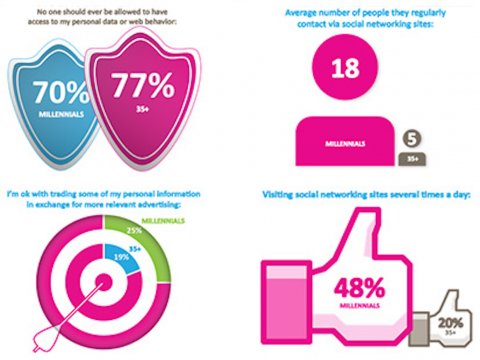 A new survey shows significant differences in the way millenials think, compared to older users of the Internet, when it comes to online privacy, access to personal data and how they share information with businesses online. The survey, conducted by the USC Annenberg Center for the Digital Future and Bovitz Inc., reveals a “Millennial Rift” -- distinct differences in online behavior and core values among Millennials (ages 18-34) compared to other users, many of whom are only a few years older. Millennials, the survey found, report more willingness to allow access to their personal data or web behavior and a greater interest in cooperating with Internet businesses -- as long as they receive tangible benefits in return (
A new survey shows significant differences in the way millenials think, compared to older users of the Internet, when it comes to online privacy, access to personal data and how they share information with businesses online. The survey, conducted by the USC Annenberg Center for the Digital Future and Bovitz Inc., reveals a “Millennial Rift” -- distinct differences in online behavior and core values among Millennials (ages 18-34) compared to other users, many of whom are only a few years older. Millennials, the survey found, report more willingness to allow access to their personal data or web behavior and a greater interest in cooperating with Internet businesses -- as long as they receive tangible benefits in return (![]() view infographic breakdown).
view infographic breakdown).
"Online privacy is dead -- Millennials understand that, while older users have not adapted,” said Jeffrey Cole, director of the USC Annenberg Center for the Digital Future. “Millennials recognize that giving up some of their privacy online can provide benefits to them. This demonstrates a major shift in online behavior -- there’s no going back."
The survey found that compared to Internet users age 35 and older, larger percentages of Millennials report:
- More enthusiasm about sharing their personal information with online businesses
- Greater receptivity to targeted advertising when their personal information is involved
- More willingness to trade personal information in exchange for relevant advertising
- Greater likelihood that they allow access to their personal data or information on their web behavior – as long as they receive concrete benefits in return
- Much larger numbers of online contacts and greater use of social networking
Millennials: different perceptions of privacy
The survey found a large percentage of Millennials – and an even larger percentage of users age 35 and older – are uncomfortable with others having access to their personal data online or information about their web behavior. When asked about the statement, “No one should ever be allowed to have access to my personal data or web behavior,” 70 percent of Millennials agreed, compared with 77 percent of users 35 and older.
However, in spite of those views, significant percentages of Millennials compared to those age 35 and older are willing to give up some of that privacy – if they benefit from it.
When asked if they would share their location with companies in order to receive coupons or deals for nearby businesses, 56 percent of Millennials agreed, compared to 42 percent of users 35 and older. And when asked if they would share information with companies “as long as I get something in return,” 51 percent of Millennials agreed, compared to 40 percent of those age 35 and older.
“We are seeing a whole new set of values driving Millennials in their behavior online,” said Greg Bovitz, president of Bovitz Inc. “The fact that Millennials are willing to part with personal information creates new opportunities for businesses to develop marketing models that capitalize on the wants of this generation of Internet users.”
Millennials are also more receptive than older users to accepting targeted advertising when their personal information is required. When asked about the statement, “I’m ok with trading some of my personal information in exchange for more relevant advertising,” 25 percent of Millennials agreed, compared to 19 percent of Internet users age 35 and older.
“Millennials think differently when it comes to online privacy,” said Elaine B. Coleman, managing director of media and emerging technologies for Bovitz. “It’s not that they don’t care about it -- rather they perceive social media as an exchange or an economy of ideas, where sharing involves participating in smart ways.
“Millennials say, ‘I’ll give up some personal information if I get something in return,’” said Coleman. “For older users, sharing is a function of trust -- ‘the more I trust, the more I am willing to share.’”
Millennials: more online contacts, more social networking use
Related findings from the annual survey by the Center for the Digital Future also reveal that Millennials are more active on social networks compared to non-Millennials. The survey also found that Millennials regularly contact many more people through social networking than users over 35 do. The average number of people whom Millennials regularly contact through social networking sites is 18, compared to only five for users over age 35.
Millennials are also more frequent users of social networking sites than older users; almost half of Millennials (48 percent) visit social networking websites several times a day, compared to only 20 percent of users age 35 and older.
Survey background
Data on social networking were developed from the Center’s annual survey – the longest continuing study of its kind and the first based on a longitudinal survey of the views and behavior of users and non-users. The annual survey has a margin of error of +/- 2.7%.
Findings on Millennials and privacy were included in the center’s Topical Survey, a new supplement to the Center’s main project that covers issues such as privacy, social media usage, use of technology at school, stress and technology, and social norms regarding the presence of technology in social settings. The Topical Survey has a margin of error of +/- 3.1%.
The Center for the Digital Future
Since 2000, the Center for the Digital Future (digitalcenter.org) has examined the behavior and views of a national sample of Internet users and non-users in major annual surveys of the impact of the Internet on America. The center also created and organizes the World Internet Project, which includes similar research with 37 international partners.
Bovitz, Inc.
Bovitz Inc (bovitzinc.com) is a design-driven research and strategy firm that helps organizations uncover opportunity and drive innovation.







